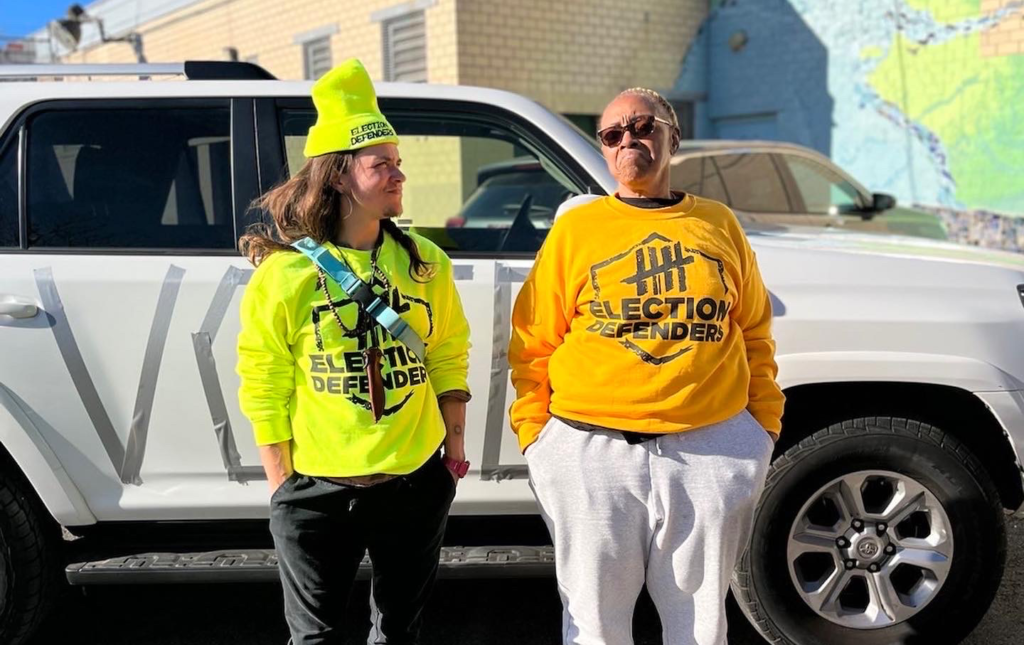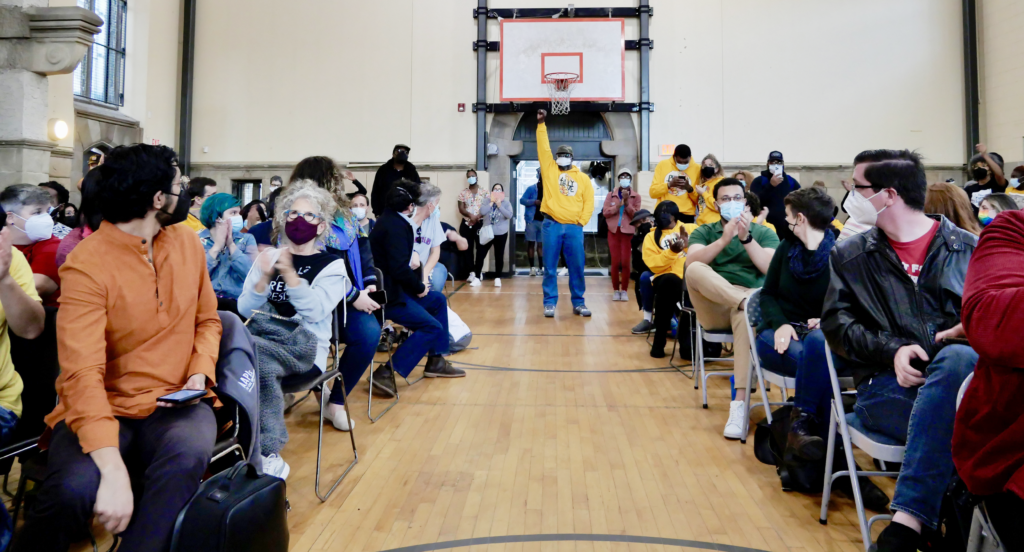
As we approach the end of the year, we are reflecting on the midterm elections and its implications for our work in 2023. From the failed red wave in the U.S. to electoral victories in the Global South, movements are pushing back and winning against right-wing ideology and authoritarian regimes.
Political victories
The progressive flex of the midterms shook up conventional punditry based on historic swing trends, startling Republicans who spent the bulk of 2022 preemptively gloating over a surge to the right due to gas prices, inflation, and President Biden’s tepid approval ratings. But movements never conceded and continued building on our defeat of Trump by strengthening our organizing muscles and broadening coalitions. A progressive front, including grassroots groups, unions, and national alliances like The Frontline, knocked on more than 30 million doors in battleground states, far outpacing 2020 numbers.
Even in states like Florida where regressive legislators won some ground, we saw an increase of voter mobilization and progressive forces continuing to stave off the red tide. Nationally, Democrats held on to control of the Senate, and the margins of the House were much tighter than Republicans trumpeted in anticipation of a hostile takeover. Movements organized and turned out to win decisive victories for progressives like Florida’s Maxwell Frost, Illinois’s Delia Ramirez, Pennsylvania’s Summer Lee, Texas’s Greg Casar, and Vermont’s Becca Balin.
Battle for the Senate
In the key swing states of Arizona, Georgia, Nevada, and Pennsylvania, a progressive coalition knocked on millions of doors, listening to voters and combating disinformation in crucial districts. This dynamic ground game ushered in three Democratic wins, tipping Senate balance 50 to 49 by flipping Pennsylvania’s Republican seat, with the Georgia election extending another month due to runoffs. UNITE HERE, the nation’s leading hospitality workers union, knocked on 2.7 million doors in those four states alone, and is now focusing on the Georgia runoff alongside many allied organizations.
Despite Democrats securing a hairline majority in the Senate, tomorrow’s election in Georgia is highly critical, given that even one Democrat holdout can result in devastating harm to frontline communities. With much on the line, from codifying the right to abortion to trans and queer people’s rights, the Green New Deal, the care agenda, and our vision of implementing a FAREconomy, a Georgia win is necessary to hold the line against a Republican House.
Beating back extremism and rising for bodily autonomy
The majority of the American electorate — particularly Gen Z and young millennial voters — proved at the ballot box that the hope, liberation, and inclusion-based policies of our movements are more powerful than the fear and hate-filled politics of the right. Voters widely dismissed Trump-endorsed, election-denying candidates who ran on platforms to overturn elections and restrict voting access that would disenfranchise BIPOC communities.
Significantly, the midterms served as a people’s referendum on abortion, a resounding denouncement of patriarchy that rejected Trumpism and the far right’s attempt to strip bodily autonomy and healthcare access. Across the nation, voters refused propositions to restrict or outlaw abortion in Kentucky and Montana, and passed legislation strengthening reproductive rights in California, Michigan, and Vermont. The right to bodily autonomy behind bars also advanced with victories banning forced prison labor in Alabama, Oregon, Tennessee, and Vermont.
Outlook
The progressive wing of the Democratic party continues to grow, championing broadly-supported bread-and-butter issues like reproductive justice, worker’s rights, and environmental and climate justice, paving the path to victory. With a blue Senate and red House, the prospects for progressive national legislation narrow — however, these victories spell out a strategy for the left to expand governing power to realize these popular visions in the years ahead.
We take inspiration from Brazilians, who kicked their far-right leader out of office for leftist candidate Luiz Inacio “Lula” da Silva in the recent presidential runoff. Taking to the streets with jubilant crowds after the election, Lula spoke about ending hunger, stopping the burning of the Amazon, and restoring democracy to the country. Our partners are calling on the new government to deliver for the broad left front that won this election, while protecting the administration from continued and forceful right-wing attacks.
As we celebrate these victories, we know that our work is far from over. Bodily autonomy remains under threat, with laws in six states restricting young trans people’s access to gender-affirming healthcare, and a majority of states attempting to rollback trans rights in some form, from restroom usage to sports team membership to inclusion in school curriculum. A divided Congress could present challenges to the 2024 election, if progress stalls on issues like reversing climate change, relieving student debt, and providing pathways to citizenship. And in Brazil, the former president has already announced a challenge to Lula in 2026.
With your support, we can continue to level the playing field and win against neofascism. Will you make a donation today to keep this work going?

For a localized perspective on these elections, we are sharing some takeaways from our member and allied international organizations:
Pennsylvania
“The victory of progressive forces in Pennsylvania this midterm election is the product of movement groups building grassroots political power over the past decade. These groups helped stop a far-right, Trump-backed election denier from the governor’s mansion, making sure that a veto to any attack on reproductive rights remains in place. They also flipped control of a Republican-held senate seat, with John Fetterman, a long-time champion of criminal justice reform, now going to D.C. Beyond that, the PA House is a single seat away from a Democratic majority, ending a generation of right-wing control of both wings of the PA Legislature.
“In Philadelphia, where young people, Black and Brown folks, and communities across the city turned out in record numbers, we are clear on our political power and priorities. We’re excited to be working with those same movement groups in the city to build a People’s Platform for a Just Philadelphia that we will carry into our 2023 primary and general elections for Mayor and City Council. We’re going to make sure whoever leads our city next contends with the priorities and campaigns of the movement groups mobilizing voters and defining turnout for historic elections like this one.”
—Bryan Mercer, Movement Alliance Project
California
“With the passage of Proposition 1, which recognizes and guarantees the right to reproductive freedom within the California state constitution, anyone with the ability to conceive a child will continue to have autonomy over their reproductive freedom. By including specific language in the law such as the right to abortion or to obtain contraception, it gives our immigrant Latina base the opportunity to decide when to go through with a pregnancy and when not to; it also helps protect them from sexual infections and creates more understanding. Historically, immigrants have not always had control over their ability to reproduce.
“Seeing that so much of our community benefits from Medi-Cal, it’s good to know that abortions or contraceptives can be fully or partially covered, this helps create good reproductive habits and expands knowledge to all regardless of class, gender identity or language. California, by including something as important as the right to reproductive freedom in its constitution, has signaled that it still believes in the right to choose and have autonomy over one’s body. It’s also helping to exemplify the structural support and protection that each state can give to its population.”
—Sofia Bastida, Gerente de Programas, Mujeres Unidas y Activas
Brazil
“In particular, Lula’s reelection as president of Brazil is an achievement that must be celebrated, both for the political project that he represents, for all the persecution that he and his party have suffered in the last eight years, and for the resounding halt that this victory represents to the neofascist project defended by a large part of the national elites. Lula’s election unites Brazil with other Latin American countries that have also elected leftist governments in recent years and demonstrates the thirst of the people of this region for policies that promote resource redistribution.“
—Leonardo Maggi, Movement of People Affected by Dams (MAB)
“We have the challenge of rebuilding mass organization in the country. We need to understand the reasons that allowed broad sectors of society, including the popular classes, to join fascism. It is necessary to strengthen political training and resume grassroots work with the people. We need to politically reconstruct our popular forces.“
—Sedes Sapientiae Institute Center for Popular Education (CEPIS)
For further analysis of the Brazilian election, check out this interview with João Pedro Stedile, founder of the Landless Workers’ Movement.
